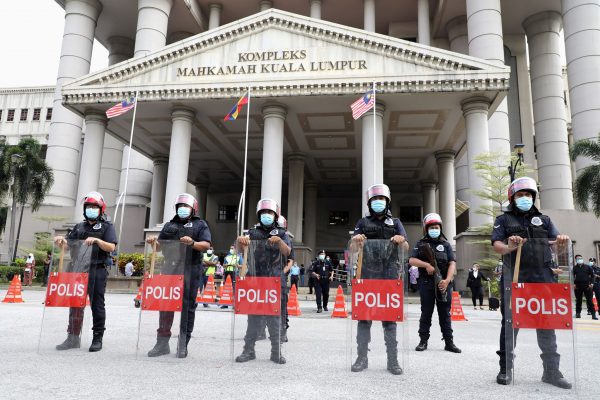The 1MDB state-owned wealth fund was established by Najib’s government in 2009 to spearhead investment in new industries in Malaysia. Instead, it became a slush fund for the prime minister and his cronies, with an estimated $4.5 billion being misappropriated for private purposes.
Cronyism and graft had become integral parts of Malaysia’s political economy during the 61 years of rule by Barisan Nasional, the coalition Najib led as prime minister and president of the United Malays National Organisation (UMNO), the formerly dominant Malay nationalist party. But Najib’s personal corruption was in a different league, staining Malaysia’s international image and contributing to the historic win for the opposition Pakatan Harapan coalition in the 2018 general elections.
In this week’s lead article, Francis Hutchinson argues that, at first glance, it appears that ‘[Najib’s] verdict is good news for Malaysian Prime Minister Muhyiddin Yassin’ — to the extent that it ‘has led many to argue that Muhyiddin would be well-served by calling for snap elections to gain legitimacy and a larger majority’.
Muhyiddin won power on the floor of parliament in March after he and other MPs defected from the Pakatan Harapan coalition and joined UMNO and the Pan-Malaysian Islamic Party (PAS) in a revanchist, Malay-Muslim dominated government that excluded the more progressive, multiracial parties that anchored Pakatan Harapan. On top of his coalition’s natural electoral advantage in the rural Malay heartland, Hutchison says, PM Muhyiddin ‘can now also plausibly claim to urban voters that he is upholding the rule of law’.
But Muhyiddin governs with a slim parliamentary majority, and his calculations are influenced by worries that his coalition partners’ agitation for snap polls is designed to rob him of the prime ministership. In Hutchison’s analysis, ‘Muhyiddin has more to gain from postponing polls, shoring up his position, and letting UMNO weaken through its own internal dynamics’.
If Muhyiddin was tempted to roll the dice and call an election, the state of Malaysia’s opposition would surely be uppermost in his mind. Antagonism towards Najib helped unite diverse blocs of voters and elites to carry the Pakatan Harapan to victory under the leadership of former UMNO strongman Mahathir Mohamad in 2018. That Najib even saw the inside of a courtroom was only because of Pakatan Harapan fulfilling its election promise to proceed with his prosecution, which had until then been blocked by Najib’s pliant attorney-general.
With Najib on the backbenches — and barred from standing for parliament in the event of an election while his conviction stands — the opposition needs to find a new unifying cause, at a time when Muhyiddin is earning credit for Malaysia’s effective handling of the COVID-19 crisis.
A renewed commitment to democratic reform, on which Pakatan Harapan only partially delivered, is one point of difference. Certainly, Muhyiddin has reverted to the worst behaviours of the Barisan Nasional governments of old: treating the state as a patronage machine, harassing independent media and intimidating critics.
The rub is that the peri-urban and rural voters Pakatan Harapan most needs are more likely to subordinate concerns about civil liberties and good governance to bread and butter issues. Malaysia is experiencing a serious recession, with GDP projected by the IMF to shrink by 3.8 per cent in 2020 — an underestimate almost surely. A RM295 billion (US$70 billion) stimulus package, equivalent to 20 per cent of GDP, has provided a safety net to industry but hasn’t prevented a sharp spike in unemployment.
Absent snap polls, Pakatan Harapan’s path back to power is on the floor of parliament. Anwar Ibrahim has been given the mandate to try to secure the numbers as its prime ministerial candidate, but malcontents are still pushing for a Mahathir comeback, or for the former Sabah chief minister Shafie Apdal to lead.
The continuation of the Anwar–Mahathir soap opera — a key ingredient in the downfall of the Pakatan Harapan government earlier this year — should prompt the opposition to contemplate some political regeneration of its own. Anwar, despite his intellectual and dissident cred abroad, remains a divisive and often-distrusted politician at home. Mahathir, at 95, is as shrewd and energetic as many politicians decades his junior, but his health will unavoidably be a source of uncertainty. Former economics minister Azmin Ali defected to help Muhyiddin form government after his rivalry with Anwar to succeed Mahathir as prime minister blew up.
So the Malaysian public is stuck with games of three-dimensional chess between — and within — teams of politicians who are, at the end of the day, former UMNO men who never got the power they wanted via that party’s channels. One thing is certain: Malaysia will not get the thoroughgoing political and economic reform it needs with the government it has. Whether Pakatan Harapan can get a second chance at prosecuting that agenda will depend as much on addressing its own dysfunctions as the performance of Prime Minister Muhyiddin.
The EAF Editorial Board is located in the Crawford School of Public Policy, College of Asia and the Pacific, The Australian National University.

